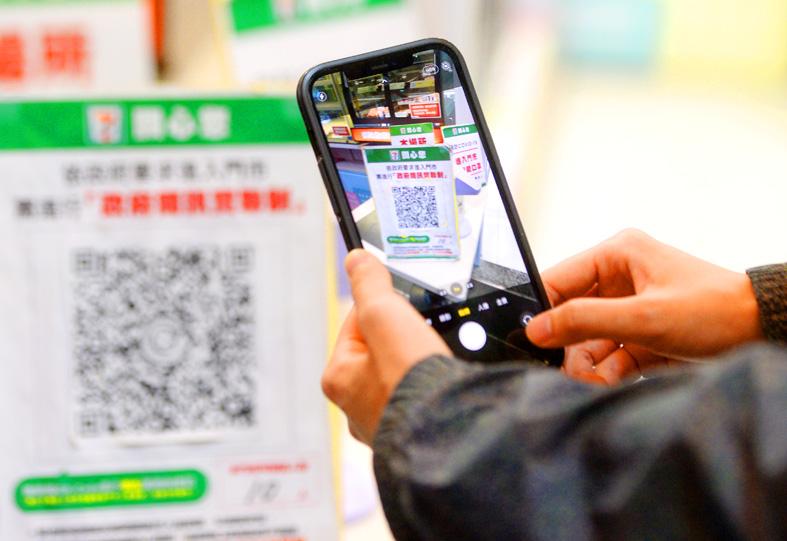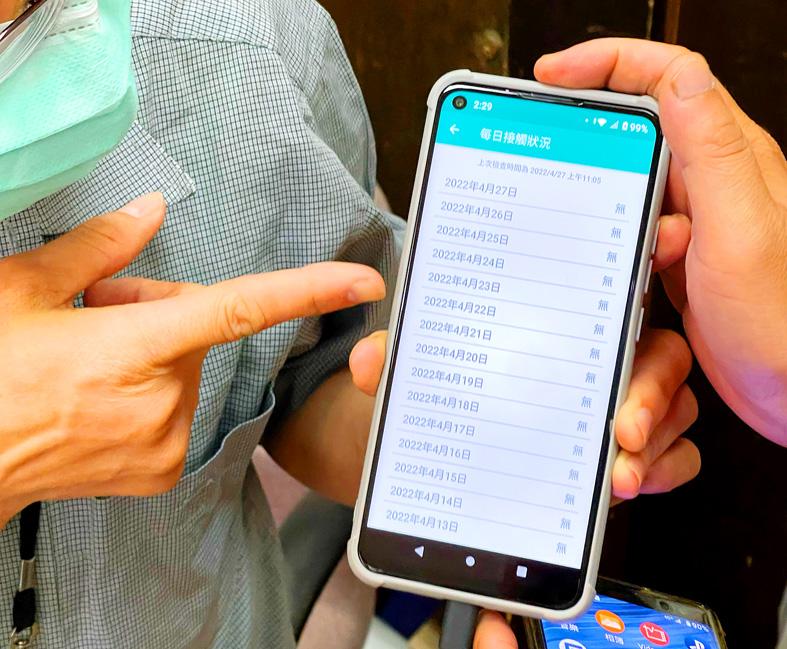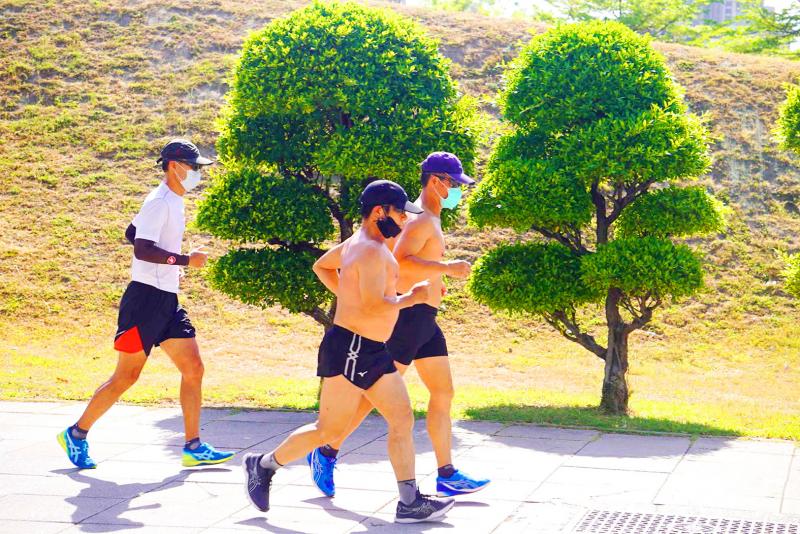The requirement to scan a QR code for contact tracing at public and business venues has been canceled, effective immediately, the Central Epidemic Command Center (CECC) announced yesterday, as it reported 8,822 local COVID-19 cases and two deaths.
Other domestic COVID-19 restrictions, including mask wearing, would remain the same throughout next month, it added.
The system of scanning a contact registration QR code was launched on May 19 last year to assist local governments in identifying close contacts of confirmed cases.

Photo: Wang Yi-sung, Taipei Times
Minister of Health and Welfare Chen Shih-chung (陳時中), who heads the center, said that the system would be aborted, as data from the system are no longer used for contact tracing, so scanning QR codes would be a meaningless inconvenience.
The center on Monday announced that it was simplifying its contact tracing efforts and only identifying “key close contacts” — people living in the same household, classmates or coworkers, who have had close contact with the case in the past two days — and placing them under home isolation.
The CECC encouraged people to download the Taiwan Social Distancing (台灣社交距離) app on their smartphone, so that they can be informed if they have come into close contact with a confirmed case.

Photo: CNA
As the app becomes more effective if more people download and use it, the center earlier this month said it hoped to reach at least 12 million users.
Chen yesterday said that it has nearly 8.2 million users so far.
Chen yesterday encouraged people to use the app and take a rapid test after being informed of exposure to a confirmed case.

Photo: CNA
Users do not need to get tested as soon as they are notified of exposure to a case, as the virus might not be detected immediately, he added.
As of Tuesday, 42,844 local infections were reported so far this year, including five deaths, Chen said, adding that 120 were classified as moderate infections and 12 as severe, accounting for 0.28 percent and 0.03 percent of the total respectively.
Of the 8,822 local infections reported yesterday, 14 new moderate cases and three severe cases were confirmed, including a death, Chen said.
Centers for Disease Control Deputy Director-General Philip Lo (羅一鈞), deputy head of the CECC’s medical response division, said that the two severe cases were a man in his 80s and a teenager, both of whom have chronic neurological disorders.
They have had pneumonia and experienced respiratory distress after contracting COVID-19, he said.
The elderly man has received three doses of a COVID-19 vaccine, but the teenager did not get vaccinated, he said,
The local death was a man in his 70s, who was hospitalized for cancer and had pneumonia after he contracted COVID-19, Lo said, adding that his condition worsened and he died of metastatic cancer, multiple organ failure and a COVID-19 infection.
Another COVID-19-associated death confirmed yesterday was an imported case — a man in his 50s, who had cancer and heart disease, Lo said.
He tested negative upon arrival on April 16, but began experiencing symptoms the following day, he said.
On April 17, the man received a test, but refused to be examined further at a hospital, and he returned home for isolation, but was found unconscious by his family members the next day and died of cardiopulmonary failure and a COVID-19 infection, Lo said.
The center’s estimation is that there could be 13,000 to 19,000 cases per day by the end of the month, Chen said.
At a minimum, cases are expected to peak at 45,000 per day, while the maximum estimate is about 100,000 cases per day, he said.
Separately, Taipei Mayor Ko Wen-je (柯文哲) was asked to elaborate, after he mentioned a potential “soft lockdown” in the city if confirmed cases in Taipei reach more than 500,000 on May 18.
A “soft lockdown” would be like the measures taken during the level 3 COVID-19 alert last year, Ko said.
It would include refraining from dining in, suspending classes and encouraging remote work, Ko said, adding that people should take action on their own without the government having to enforce tough measures.
Additional reporting by Cheng Ming-hsiang and CNA

Taiwan has received more than US$70 million in royalties as of the end of last year from developing the F-16V jet as countries worldwide purchase or upgrade to this popular model, government and military officials said on Saturday. Taiwan funded the development of the F-16V jet and ended up the sole investor as other countries withdrew from the program. Now the F-16V is increasingly popular and countries must pay Taiwan a percentage in royalties when they purchase new F-16V aircraft or upgrade older F-16 models. The next five years are expected to be the peak for these royalties, with Taiwan potentially earning

POSITIVE DEVELOPMENT: Japan and the US are expected to hold in-depth discussions on Taiwan-related issues during the meeting next month, Japanese sources said The holding of a Japan-US leaders’ meeting ahead of US President Donald Trump’s visit to China is positive news for Taiwan, former Japan-Taiwan Exchange Association representative Hiroyasu Izumi said yesterday. After the Liberal Democratic Party’s landslide victory in Japan’s House of Representatives election, Japanese Prime Minister Sanae Takaichi is scheduled to visit the US next month, where she is to meet with Trump ahead of the US president’s planned visit to China from March 31 to April 2 for a meeting with Chinese President Xi Jinping (習近平). Japan and the US are expected to hold in-depth discussions on Taiwan-related issues during the

‘LIKE-MINDED PARTNER’: Tako van Popta said it would be inappropriate to delay signing the deal with Taiwan because of China, adding he would promote the issue Canadian senators have stressed Taiwan’s importance for international trade and expressed enthusiasm for ensuring the Taiwan-Canada trade cooperation framework agreement is implemented this year. Representative to Canada Harry Tseng (曾厚仁) in an interview with the Central News Agency (CNA) said he was increasingly uneasy about Ottawa’s delays in signing the agreement, especially as Ottawa has warmed toward Beijing. There are “no negotiations left. Not only [is it] initialed, we have three versions of the text ready: English, French and Mandarin,” Tseng said. “That tells you how close we are to the final signature.” Tseng said that he hoped Canadian Prime Minister Mark Carney

STAY IN YOUR LANE: As the US and Israel attack Iran, the ministry has warned China not to overstep by including Taiwanese citizens in its evacuation orders The Ministry of Foreign Affairs (MOFA) yesterday rebuked a statement by China’s embassy in Israel that it would evacuate Taiwanese holders of Chinese travel documents from Israel amid the latter’s escalating conflict with Iran. Tensions have risen across the Middle East in the wake of US and Israeli airstrikes on Iran beginning Saturday. China subsequently issued an evacuation notice for its citizens. In a news release, the Chinese embassy in Israel said holders of “Taiwan compatriot permits (台胞證)” issued to Taiwanese nationals by Chinese authorities for travel to China — could register for evacuation to Egypt. In Taipei, the ministry yesterday said Taiwan